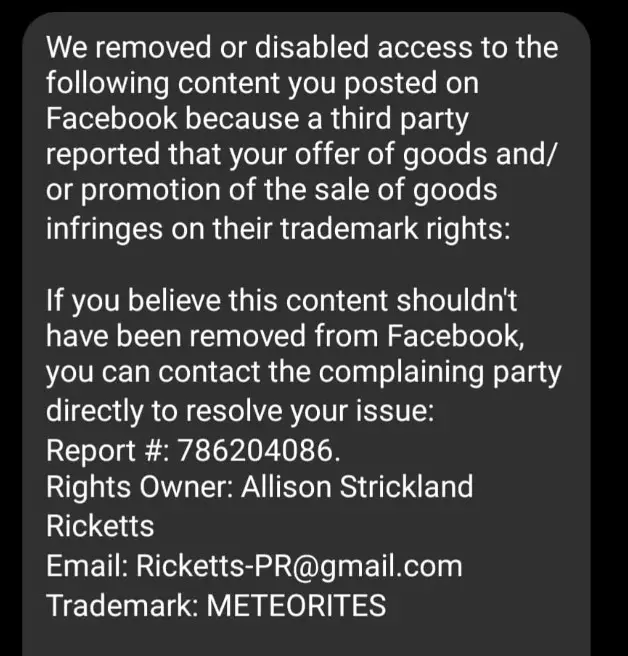Allison Strickland Ricketts Scam Trademark Meteorites on Facebook – Beware!
Have you received a Facebook message that says your account was reported by Allison Strickland Ricketts for Meteorites trademark rights ? Beware! it is a scam. The message was sent by scammers whose aim is to gain access to your facebook account once you click on the link attached.
This article provides information on how the scam works, and what to do if you’re victim of this scam.
How does the Allison Strickland Ricketts Meteorites Scam work?
The scam starts with a Facebook message from a scammer posing as Meta Facebook, the scammer claims the recipient’s Facebook account was reported by Allison Strickland Ricketts for using her trademark word ‘Meteorites’. Recipients are told to review the content posted and verify their account using the link attached to the message. However, that is where the scam comes in.
The link attached to the message is a malicious link that asks you to login to your Facebook. Once you do so, the scammers would get access to your Facebook account. Then proceed to scam your Facebook friends.
Currently, more than five hundred people have received the Facebook message. Which clearly indicates that it is a scam.

Allison Strickland Ricketts Trademark Meteorites Scam – Redflags That Stand Out
1. It’s not actually a communication from Facebook.
The first indicator that the message is a scam is that it wasn’t sent from an official Meta account. The profile rather displays just numeric numbers, and says ‘Business account’. Real messages from Facebook always come from the Facebook ‘Meta’ Profile.
2. Not From Alison Strickland Ricketts
Your Facebook account wasn’t reported by Alison Strickland Ricketts as claimed in the scam message. Scammers are simply using her name to make their phishing text appear legit. Allison Strickland Ricketts herself has issued a warning to the public about the ongoing Facebook scam.
3. No Blue Verified Facebook Tick
Facebook/Meta uses a verified page that has a blue tick. Whereas this one has none.
4. Typos, incorrect grammar, and awkward language.
Regardless of platform (social, text, email), typos and spelling/grammar errors are a huge red flag that you may be being targeted by a scammer. Proceed with caution.
5. Urgency.
In addition to incorrect language and conventions, urgency is another red flag. The Scammers create urgency that forces you to make a decision or click on something quickly in hopes that you will act without thinking things through.
6. Links that aren’t quite right.
Facebook will typically use buttons to prompt users to click something as opposed to imbedding links. Scammers often use links that inverse a couple letters or are just slightly off so, at first glance, they look legitimate.
What To Do If You Received The Allison Strickland Ricketts Scam Facebook Message
Do Not Click On The Link
Don’t attempt to click on the link no matter how legit it looks. Clicking on it takes you to a login page that asks for your login credentials.
Report The Account
Report the business account that sent you the message. You can do so by visiting the ‘Help Center’ on your Facebook Settings. There’s an option for reporting Impersonation and Fake accounts.
Inform Your Facebook Friends and Family
Creating awareness about the scam would help protect people from being a victim. You can also share a link of this post on your Facebook so your friends can read how the scam works.
What To Do If You’ve Already Clicked on The Malicious Link
If you are able to log into your account, secure your account by resetting your password and logging out of any devices you don’t own.
Enable two factor authentication
However, if you can’t get into your account and your username or password don’t work, follow the steps below;
- Go to the Find Your Account page at facebook.com/login/identify and follow the instructions. Make sure to use a computer or mobile phone that you have previously used to log into your Facebook account.
- Search for the account you want to recover. You can search for your account by name, email address, or phone number.
- Follow the on-screen steps to reset the password for your account.
Conclusion
The Allison Strickland Ricketts Facebook scam uses deceptive tactics to trick Facebook users into clicking a malicious link that asks for their Facebook login details. Beware! The message is not from Meta, your account was not disabled or reported.
See similar phishing scam; SharpUSPS scam text, Wal Tracking Scam, Delware BPO Scam, Publix 90TH Anniversary, etc.
